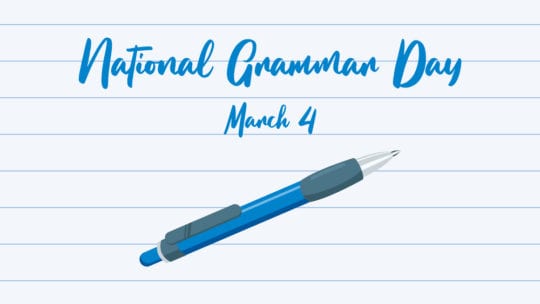
For those of you with voracious appetites for finding typos on CNN's news ticker, or comma splices in The New York Times, we wish you a happy National Grammar Day!
Many of our articles extol the importance of a PR pro writing crisply, clearly and error free. Companies gain their reputation, in part, through press releases, thought leadership content, but also in social media posts and email. Errors in grammar can send a campaign into a spiral when not caught quickly.
Over the years, we've published several articles on becoming a better writer and how to avoid mistakes.We gathered some of the most popular grammatical tips from them for you to enjoy on National Grammar Day.
Comma Usage in a Series
Also called the “Oxford comma,” this term refers to a comma that separates the penultimate item in a list from the final item. A conjunction (and or or) introduces the final item in Chicago style. For AP style, no comma is used.
Ex:
She bought eggs, bacon and bread. (AP style)
She bought eggs, bacon, and bread. (Oxford comma, Chicago style)
Possessive Apostrophes
For singular common nouns that end in s, use apostrophe-s. If the following word begins with s, then just use an apostrophe. If the common noun is plural, use just an apostrophe.
Ex:
Singular common noun
Texas’s baseball teams
Texas’ stadiums
Plural common noun
The babies’ bottles
Passive Voice
When using the active voice, the subject of the sentence performs the verb's action. Some telltale signs of passive voice are these words or phrases: by the, was, is, has been, will be. Writing in the active voice will ensure your work is clear and avoids run-on sentences.
Passive: The house was destroyed by termites.
Active: Termites destroyed the house.
Dangling Modifiers
You’ll find these in a sentence where the descriptive phrase doesn’t match up with the noun immediately following it, which causes confusion.
Dangling modifier: After rising for months, the governor decided to change her policy on unemployment.
This sentence structure causes unnecessary ambiguity. What rose for months? The governor or unemployment? The writer is trying to express that unemployment is rising. Try flipping the sentence:
Corrected: The governor decided to change her policy on the rise in unemployment.
Affect vs. Effect
Most of the time, affect should be used as a verb, marking a change or impact or modification. Effect should be used as a noun, which means a result of a change or action. However, effect can also be used as a verb in certain contexts, meaning to inflict or create.
Ex.
The snowstorm affected the birthday party turnout. (verb)
Eating too much ice cream produced a headache effect. (noun)
The new rules hope to effect change in employee morale. (verb)
